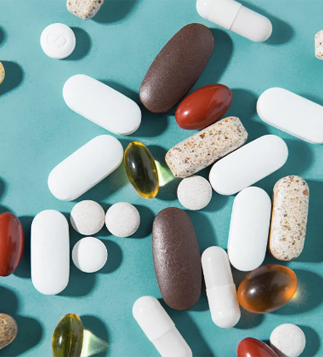Are Gut Health Supplements the Key to Better Digestive Health?
 While some supplements have decent evidence to back up their gut health claims, others do not. Here’s what to know.
While some supplements have decent evidence to back up their gut health claims, others do not. Here’s what to know.
- Lesley Beck, RD, timescolonist.com 1
More and more people are prioritizing their gut health.
Whether to ease uncomfortable bloating or gas pain, promote regularity or simply build a robust gut microbiome, it’s increasingly recognized that the foods we eat influence digestive health and, in turn, our overall health.
Not surprisingly, supplements claiming to bolster gut health are proliferating on social media and online.
Are gut health supplements the key to better digestive health? Here’s what to know.
What Does “Gut Health” Actually Mean?
Gut health is a popular but poorly understood term. It’s been widely accepted by bloggers and social media influencers, but there isn’t an agreed upon scientific definition.
Many experts define gut health by the absence of gastrointestinal symptoms (e.g., bloating, gas, abdominal pain, diarrhea, constipation) and disease (e.g., inflammatory bowel disease, colon cancer).
Gut health can also refer to having a greater diversity of microbial species in your gut microbiome, the community of trillions of bacteria and other micro-organisms that live inside your large intestine.
A diverse microbiome can help fend off illness-causing bacteria and viruses. And it’s thought to guard against asthma, inflammatory bowel disease, depression, obesity, type 2 diabetes and heart disease, among other conditions.
Your gut microbiome also interacts with your immune system and, in doing so, helps regulate inflammation in the body.
Do Gut Supplements Live up to their Hype?
While some supplements have decent evidence to back up their gut health claims, others don’t.
L-glutamine
- Promoted to “heal the gut lining,” “strengthen the intestinal wall” and treat “leaky gut” despite limited evidence. (Leaky gut, or intestinal permeability, occurs when the lining of the gut becomes more permeable than normal, allowing toxins to pass into the bloodstream.)
Glutamine
- An amino acid produced by skeletal muscles and supplied by diet, fuels cells that line the intestinal tract, thereby helping to build a strong intestinal barrier.
- Only two small studies support a possible role for glutamine in IBS. Among 44 patients, daily glutamine supplementation (15 g) for six weeks, combined with a low FODMAP diet, improved IBS severity symptom scores to a greater degree than the diet alone. (The low FODMAP diet alone was also shown to be beneficial.)
- Preliminary research also suggests that taking glutamine (15 g daily) helps ease symptoms of postinfectious, diarrhea-dominant IBS. Larger trials are needed to validate these findings.
- A 2021 review of seven clinical trials concluded that glutamine supplementation does not improve symptoms of Crohn’s disease, an inflammatory bowel disease.
Collagen
- The protein that forms connective tissue in skin, bones, muscles, tendons and ligaments, has been referred to as a “digestive super food.”
- Collagen supplements are touted to strengthen the gut lining, improve leaky gut, aid digestion and relieve IBS symptoms. Bone broth, a source of collagen, is also promoted for gut health.
- I found only one published study that was conducted in people. Among 14 healthy women who took 20 g of collagen peptides for six weeks, most reported fewer mild digestive symptoms, including bloating. There was no control group for comparison. Hardly a rigorous study.
Probiotic Supplements
- Randomized controlled trials have demonstrated that specific strains of probiotic bacteria can improve ulcerative colitis, constipation, IBS symptoms, antibiotic-associated diarrhea and traveller’s diarrhea.
- This doesn’t mean, though, that taking a one-a-day probiotic supplement is a fast-track to a healthy gut for people without gastrointestinal conditions.
- While studies conducted in healthy people have shown that taking a probiotic supplement increases the amount of healthy bacteria in the gut, this may or may not be a good thing.
- It’s possible that taking a concentrated amount of a few probiotic strains could upset the balance of your gut microbes. You might not only be crowding out some of the bad microbes but also some of the beneficial ones.
- Probiotic supplements may have different effects in different people depending on their unique gut microbiome.
- Research also suggests that taking a probiotic supplement after antibiotic treatment delays the return of the gut’s normal bacteria.
- Small studies have shown that supplements of prebiotics, fibres that nourish good gut microbes, help treat constipation, regulate gut inflammation and beneficially alter gut microbiome composition.
It’s best to nourish your gut bacteria with fibre-rich whole foods rather than a purified prebiotic supplement. Prebiotic supplements may worsen bloating and gas in some people with IBS.
How to Promote a Healthy Gut
- There’s no quick fix to a healthy gut or, for that matter, a flat belly, despite what you see on TikTok.
- Evidence does, however, point to healthy lifestyle habits that can benefit gut health. Regular exercise, proper sleep, managing stress and limiting alcohol intake are among them.
- So is eating a healthy diet. Diet is considered the most powerful tool that can alter the composition and activity of the gut microbiome.
- A diet rich in whole grains, vegetables, fruits, nuts, seeds, beans and lentils provides prebiotic fibres, polyphenols and other compounds that nourish healthy gut bacteria. Fermented foods that contain probiotic bacteria are also thought to benefit gut health.
Listen to Mairlyn Smith Talk Fibre on ‘A Canadian Celiac Podcast!’
When to Check in with Your Doctor
- Ongoing gastrointestinal symptoms such as diarrhea and abdominal pain could indicate a health problem that requires medical care. Consult your doctor before experimenting with supplements.
Leslie Beck, a Toronto-based private practice dietitian, is director of food and nutrition at Medcan. Follow her on X @LeslieBeckRD













